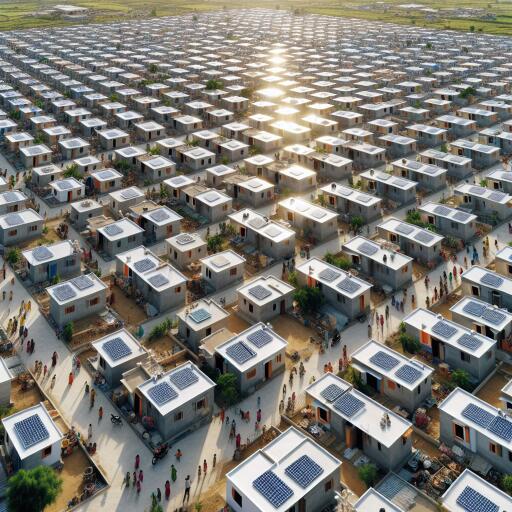
Solar Rooftop: UP to Illuminate 25 Lakh Low-Income Households
In an ambitious move to embrace renewable energy, Uttar Pradesh is set to implement a groundbreaking initiative targeting the illumination of 25 lakh low-income homes utilizing rooftop solar power. This initiative forms the backbone of the broader PM Suryodaya Yojna, unveiled by Prime Minister Narendra Modi, aimed at fostering a solar revolution across the nation.
The PM Suryodaya Yojna, spotlighted by the Prime Minister in a significant announcement, lays out the grand vision of solarizing one crore households across India. Under this transformative scheme, participating households are anticipated to enjoy the benefits of up to 300 units of complimentary electricity every month, thanks to the power harnessed from the sun.
Insiders familiar with the project’s blueprint reveal that Uttar Pradesh is crafting a meticulously tailored strategy to ensure an expansive coverage under this scheme. Eligible beneficiaries of this programme are poised to enjoy a government subsidy that scales up to 70% for solar rooftop installations ranging between 1 kW and 2 kW capacity. Furthermore, for installations with a capacity of 3 kW, the subsidy offered is around 60%, with these benefits progressively tapering for capacities extending up to 10 kW.
Despite awaiting formal national launch details expected in the early days of March, Uttar Pradesh has boldly set a target to embrace 25 lakh households under this program. This target specifically focuses on families within the 1 kW-2 kW consumption slab, correlating to those whose monthly electricity usage does not exceed 300 units.
Officials underscore that the state harbors close to 2 crore households falling into the specified load slab. “With such a vast pool of eligible beneficiaries, we are confident in our capacity to extend the scheme’s benefits to at least 25 lakh low-income families within the state,” an official elaborated.
At the helm of steering this monumental initiative, the chief secretary underscored the importance of garnering widespread awareness. Consequently, directives were issued to amplify the scheme’s visibility through advertisements and the organization of camps aimed at fostering maximal public engagement.
In a bid to streamline the implementation mechanism, Uttar Pradesh has drawn inspiration from the Gujarat model. Adopting a substation-wise approach, the state intends to register 25,000 households each day, propelling forward towards its ambitious target. Unique to this process is the inclusion of technology, with registrations facilitated through a dedicated mobile application and website, ensuring ease of access for the intended beneficiaries.
Ensuring a seamless transition to solar power for low-income households, the subsidy process under this scheme is designed for efficiency. Selected beneficiaries will witness the subsidy amount being directly credited to their bank accounts, leveraging the direct debit system. Such measures underscore a commitment to not only fostering sustainable energy solutions but also ensuring the economic inclusivity of low-income groups in Uttar Pradesh’s march towards a brighter, solar-powered future.





Leave a Reply